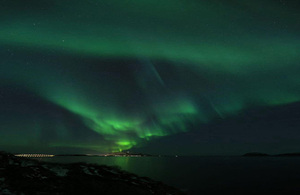SIN Denmark leads on Arctic event at Arctic Frontiers in Norway
Arctic Changes – Impacts on local communities and inclusion of indigenous knowledge

Northern Lights
Indigenous people have lived in the Arctic for millennia. Approximately 500,000 of the region’s four million inhabitants belong to indigenous groups with their own identities, cultures, languages and traditions. Changes to ecosystems and biodiversity as a consequence of climate change will have considerable impact upon the lives of Arctic residents, including the many indigenous people who rely for subsistence upon the natural resources of the region. It is therefore of vital importance that the views, knowledge and experience of indigenous inhabitants of the Arctic are included in governance and research of the region.
The UK’s Arctic Policy Framework, which sets out our overall approach to the Arctic, states that the UK will respect the views, interests, culture and traditions of Arctic indigenous peoples and promote the participation of indigenous peoples in decision-making. The undertaking and use of high quality independent science underpins all of the tenets of the Framework and contributes to delivering many of its objectives. On this background, the UK’s Science and Innovation Network and the British Embassy in Oslo hosted a side event to the Arctic Frontiers conference in Tromsø on 22 January 2015, facilitating discussions on how to ensure that the knowledge of indigenous peoples is included in the scientific research and debate on the changing Arctic.
Traditional Knowledge and Science
25 researchers, indigenous representatives and officials from the UK, Norway, Denmark, Greenland, Sweden, Canada, the USA, Russia and Nepal attended the roundtable and engaged in fruitful discussions. All attendees agreed that Traditional Knowledge (TK) is important to its holders and their communities. A number of areas where exchange between TK and science can be beneficial were identified, including wildlife biology and management, geology, ecosystem management, climate and climate change impacts, weather, and sea ice dynamics.
Indigenous Innovation
Enthusiasm for the future of TK was strong around the table. Participants anticipate that TK systems and TK holders will generate innovation in the north and this is something to watch for. A senior researcher from Denmark speculated that growth in Greenland’s economy in the near future is likely to first come from small-scale innovative projects (for example, an organic skin care line based on local ingredients) rather than large-scale oil and mining projects. From Nepal there was an example of innovative irrigation solutions in villages in the Himalayas, which highlighted how local populations are uniquely situated and motivated to mitigate the social impacts of climate change.
A Co-Approach
Some challenges were also identified: The divide between quantitative and qualitative knowledge was raised repeatedly and perfectly illustrated by a first nations participant from Canada who highlighted that scientists work with numbers – 1,2,3 – but her language doesn’t have numbers, only words – many, few, none. There was a general consensus at the table that “Co“ is the best approach: co-production of knowledge, co-management of resources and ecosystems, and co-operation between TK holders, scientists, and government is needed. Some of the senior scientists at the table indicated that science has something to learn from traditional knowledge, and that the scientific machine is slowly beginning to see that in addition to statistics and experimental results, the cumulative general knowledge built over a career can, and should be passed on
Next Steps
The Arctic roundtable showed that there is potential for much more collaboration and discussion in this field, and SIN Denmark is planning to follow up on the event later this year. You are welcome to contact SIN Officer Mai Valentin Nielsen at [email protected] for more details on how to become involved.